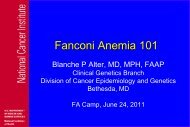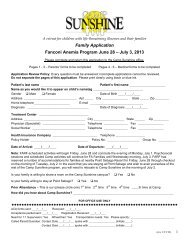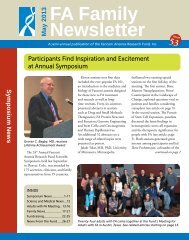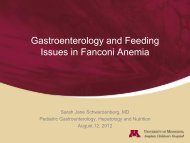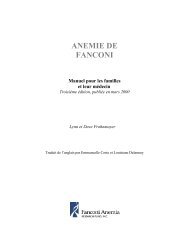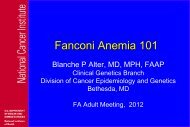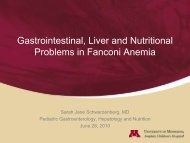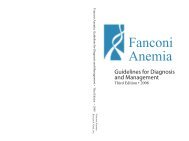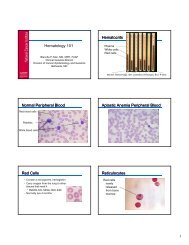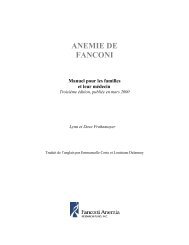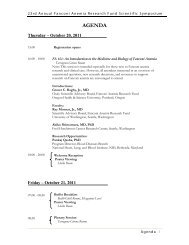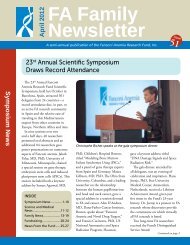FA Family Newsletter - Fanconi Anemia Research Fund
FA Family Newsletter - Fanconi Anemia Research Fund
FA Family Newsletter - Fanconi Anemia Research Fund
- No tags were found...
Create successful ePaper yourself
Turn your PDF publications into a flip-book with our unique Google optimized e-Paper software.
Understanding the Genetics of <strong>FA</strong>:Carriers, Complementation Groups and Cancer RiskScience News From the <strong>Family</strong> MeetingCertified genetics counselor Heather Zierhut, MS,University of Minnesota Medical Center, gave attendeesat Camp Sunshine a primer on the genetics of <strong>Fanconi</strong>anemia. Approximately one in 181 individuals is acarrier of <strong>FA</strong>. In the Ashkenazi Jewish population, carrierfrequency is one in 90.To know if relatives of an <strong>FA</strong> patient are carriers, onemust know the <strong>FA</strong> patient’s specific disease mutations.If one mutation has been passed on to a relative, thatindividual is a carrier of <strong>FA</strong>. When two carriers of diseasemutations in the same gene have children, there is a onein four chance that a child will have <strong>FA</strong>, a two in fourchance that children will be carriers, and a one in fourchance that the child will not have <strong>FA</strong> nor be a carrier.Fifteen <strong>FA</strong> genes have been discovered, andpatients with defects in the same gene are in the same“complementation group.” Most complementationgroups are not associated with an elevated risk of cancer incarriers. However, studies show an elevated risk of cancerin carriers from five different complementation groups.The <strong>FA</strong>NCD1/BRCA2 gene mutations confer a 45%risk of breast cancer to carriers by age 70 and up to an80% risk of breast cancer during one’s lifetime. Ovariancancer is also a major concern for women carriers. Malecarriers in this complementation group are at increasedrisk of breast and prostate cancer. Two complementationgroups, <strong>FA</strong>NCN and <strong>FA</strong>NCJ, typically double a carrier’sbreast cancer risk. One study showed that <strong>FA</strong>NCCalso doubles the risk of breast cancer for <strong>FA</strong> carriers.A newly discovered <strong>FA</strong> gene, <strong>FA</strong>NCO/RAD51C, isalso associated with ovarian cancer in the generalpopulation. The specific gene mutations that a personcarries can influence the specific cancer risks. Carriersare encouraged to discuss these risks with a geneticcounselor and/or their health care providers.Dietitian Advises to “Eat the Rainbow!”Carol Ceresa, RegisteredDietitian, Veteran’sAdministration MedicalCenter, San Francisco,spoke to Camp Sunshineattendees about theimportance of goodnutrition in maintainingoptimal health and helpingto prevent cancer. Allthree of her sisters had<strong>Fanconi</strong> anemia, which inspired her early interest in theprotective effects of nutrient-rich foods.Ceresa highly recommends the book What Coloris your Diet? by David Heber, MD, PhD, Directorof Human Nutrition, UCLA. Choosing fruits andvegetables covering a wide range of bright colorspromotes good health. She recommended eating twocups of fruit and two cups of vegetables daily and leavingthe skins on whenever possible.Ceresa believes that certain foods may protect againstcancer and cited a recent study by Tong Chen, MD,PhD, Ohio State University, which suggests that freezedriedstrawberries might play a role in preventingesophageal cancer. Other foods thought to have anticancerproperties include turmeric (which contains theanti-inflammatory curcumin), mushrooms (especiallyshiitake), walnuts and avocados. Ceresa recommendedthe book Healing Spices by Bharat B. Aggarwal, PhD,University of Texas, M.D. Anderson Cancer Center,which details healing properties of foods and spices.Butter should be avoided in favor of monounsaturatedfats such as olive oil, avocado oil, peanut oil and walnutoil. One should avoid foods rich in fats, such as pizza,cheese, hotdogs, sausage, bacon, ribs and fried food.Avoid foods high in sugar (sodas, fruit drinks, sweet teas,candy, desserts) and choose whole grains such as brownrice over white rice. Eat fish twice a week (especially oilrichfish such as salmon, sardines and mackerel). And,Ceresa concluded, “don’t forget to ‘eat the rainbow!’”4 <strong>Family</strong> <strong>Newsletter</strong> #50



